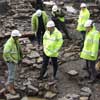Archaeological Planning
Archaeological Development Control

The Welsh Archaeological Trusts' Advisors Code of Practice
The work of the four Welsh Archaeological Trusts includes the maintenance of Historic Environment Records for their respective regions, the provision of specific archaeological and other historic environment advice, and the implementation of schemes to mitigate the impact of development on archaeological remains.
There can be circumstances when a Welsh Archaeological Trust provides advice on archaeological and other historic environment matters as part of the planning process (Advisor function) and delivers works arising from that advice (Practitioner function). Funding for the Advisor work is provided by Welsh Government grants administered through Cadw and support from the Local Planning Authorities. The Welsh Archaeological Trusts, Welsh Government and Welsh Local Authorities work together to ensure that advice on historic environment matters is given by competent persons.
The Trusts have at the request of Welsh Government drawn up a Code of Practice that identifies the procedures that the four Welsh Archaeological Trusts have introduced to ensure that there is a clear separation between their Advisor and Practitioner roles so that conflicts of interest are avoided. It complements, rather than replaces, other codes of practice, codes of conduct, and standards and guidance used in the professional practice of archaeology.
The Code of Practice is founded on seven principles:
- 1. Advisor and Practitioner functions will be carried out independently by separately managed sections or teams within each Trust.
- 2. The Advisors at each Trust will provide informed, impartial and independent professional advice on the implications and impact of proposed developments on the historic environment. All advice will comply with relevant Welsh Government policy, advice and guidance.
- 3. All confidential or privileged information provided to or by the Advisors of the Trust will be securely managed to maintain confidentiality.
- 4. For development management and historic environment advisory work, the Advisors at each Trust will treat Practitioner functions within the Trust in the same manner as all other practitioners. There will be no preferential exchange of information within the Trusts.
- 5. The Advisors at each Trust will direct anyone inviting tenders for archaeological work to appropriate independent sources of information to enable them to select suitably qualified archaeological practitioners.
- 6. The Advisors at each Trust recognise that those intending to commission archaeological work may wish to engage an independent archaeological consultant to prepare or assess a written scheme of investigation, project design or specification of works intended to satisfy an archaeological brief, to monitor the progress of the work, or to provide advice on recommendations for further action.
- 7. The Advisors at each Trust will provide impartial professional assessment and approval of archaeological briefs, project designs, written schemes of investigation, and the subsequent archaeological works and reports, irrespective of the contractual delivery arrangements.





